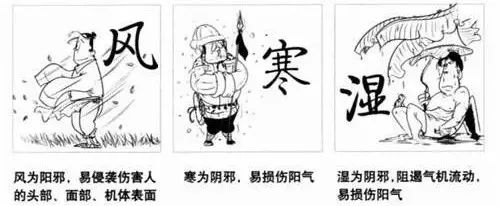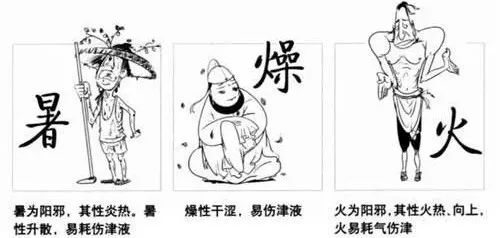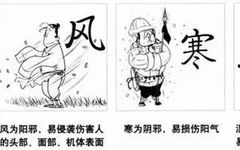 There are many pathogenic factors for diseases, such as external Six Excesses (liuxie), internal emotional injuries, irregular diet, insect bites, and overexertion during sexual activity. Another factor is the malevolent energy of nature, which refers to infectious diseases.Commonly, we say that colds can be caused by Wind Cold (fenghan), Wind Heat (fengre), and Summer Dampness (shushidong), which all fall under the Six Excesses. What are the characteristics of these pathogenic factors?Traditional Chinese Medicine (TCM) states that wind is the leader of all diseases, meaning that the Wind Evil (fengxie) is very cunning, transforming into Wind Dampness (fengshui) with dampness, Wind Cold (fenghan) with cold, and Wind Heat (fengre) with heat.The Wind Evil is classified as a Yang evil, which easily attacks the human body. For example, when the Wind Evil attacks the skin, it can cause chills; if it stays in the skin, it can lead to itching or even rashes; if it resides in the muscles, it can cause spasms and convulsions.There is also internally generated wind, including Heat Generating Wind (reji shengfeng) and Blood Deficiency Generating Wind (xuetong shengfeng). For instance, a high fever can lead to convulsions, while Blood Deficiency (xuetong) can cause dizziness.The pathogenic characteristics of Wind Evil include: its light and upward nature, allowing it to manifest in any part of the body; its ability to change and move unpredictably, such as in cases of urticaria (hives) that can appear in different locations; and symptoms often include aversion to wind, spontaneous sweating, and itching.What are the characteristics of Cold Evil (hanxie)? Cold Evil is classified as a Yin evil, which can easily damage the body’s Yang Qi, affecting the circulation of Qi and Blood.There are two types of Cold Evil: external and internal. External Cold Evil can invade the body surface, leading to symptoms such as aversion to cold, absence of sweating, headaches, and joint pain. In severe cases, it can cause the Yang Qi to stagnate, resulting in fever.
There are many pathogenic factors for diseases, such as external Six Excesses (liuxie), internal emotional injuries, irregular diet, insect bites, and overexertion during sexual activity. Another factor is the malevolent energy of nature, which refers to infectious diseases.Commonly, we say that colds can be caused by Wind Cold (fenghan), Wind Heat (fengre), and Summer Dampness (shushidong), which all fall under the Six Excesses. What are the characteristics of these pathogenic factors?Traditional Chinese Medicine (TCM) states that wind is the leader of all diseases, meaning that the Wind Evil (fengxie) is very cunning, transforming into Wind Dampness (fengshui) with dampness, Wind Cold (fenghan) with cold, and Wind Heat (fengre) with heat.The Wind Evil is classified as a Yang evil, which easily attacks the human body. For example, when the Wind Evil attacks the skin, it can cause chills; if it stays in the skin, it can lead to itching or even rashes; if it resides in the muscles, it can cause spasms and convulsions.There is also internally generated wind, including Heat Generating Wind (reji shengfeng) and Blood Deficiency Generating Wind (xuetong shengfeng). For instance, a high fever can lead to convulsions, while Blood Deficiency (xuetong) can cause dizziness.The pathogenic characteristics of Wind Evil include: its light and upward nature, allowing it to manifest in any part of the body; its ability to change and move unpredictably, such as in cases of urticaria (hives) that can appear in different locations; and symptoms often include aversion to wind, spontaneous sweating, and itching.What are the characteristics of Cold Evil (hanxie)? Cold Evil is classified as a Yin evil, which can easily damage the body’s Yang Qi, affecting the circulation of Qi and Blood.There are two types of Cold Evil: external and internal. External Cold Evil can invade the body surface, leading to symptoms such as aversion to cold, absence of sweating, headaches, and joint pain. In severe cases, it can cause the Yang Qi to stagnate, resulting in fever. Internal Cold Evil occurs when it invades the organs, such as when consuming cold or raw foods, leading to stomach pain, or when it invades the intestines, causing abdominal pain and diarrhea. Yang Deficiency (yangxu) can also lead to external Cold Evil, manifesting as cold hands and feet.Cold Evil tends to constrict and draw in, often resulting in tightness in the muscles or pain due to blood stasis; it can easily damage the body’s Yang Qi; and it can transform into heat internally, potentially causing fever.What are the characteristics of Summer Evil (shuxie)? Summer Evil often occurs in hot summer months, leading to conditions like heat stroke. Symptoms of Summer Evil typically include fever, sweating, dry mouth, and reduced urination.Summer Evil can be categorized into Yin Summer (yinyin shuxie), Yang Summer (yangshuxie), and Damp Summer (shushidong). For example, heat stroke from staying in an air-conditioned room is often Yin Summer, which can be treated with Huo Xiang Zheng Qi San (Huo Xiang Correct Qi Powder); Yang Summer is caused by exposure to intense sunlight or high temperatures, which can be treated with Shi Di Shui (Ten Drops Water); Damp Summer often presents with heavy limbs, poor appetite, chest tightness, vomiting, and loose stools.Damp Evil (shui xie) is classified as a Yin evil. Many people complain of excessive dampness, which can be categorized into external and internal dampness.External dampness can occur from being caught in the rain or living in a cold, damp environment, leading to symptoms such as heaviness in the head, joint pain, fatigue, and swelling in the limbs.Internal dampness can arise from consuming cold foods and excessive drinking, leading to weakened spleen and stomach function, which is insufficient to transform and transport water and dampness. When dampness stagnates in the intestines, it can cause diarrhea; when it stagnates in the stomach, it can lead to indigestion, nausea, and vomiting; when it stagnates in the lower jiao, it can cause excessive vaginal discharge and dampness in the scrotum.The pathogenic characteristics of Damp Evil include: it can occur in any part of the body; it is heavy and turbid, often accompanied by fatigue and a heavy body; and it is difficult to eliminate, often lingering after exposure to sticky dampness.Dry Evil (zaoxie) often occurs in autumn and can easily damage the body’s fluids. For example, some people may experience dry cough without phlegm in autumn, which is often caused by Dry Evil.
Internal Cold Evil occurs when it invades the organs, such as when consuming cold or raw foods, leading to stomach pain, or when it invades the intestines, causing abdominal pain and diarrhea. Yang Deficiency (yangxu) can also lead to external Cold Evil, manifesting as cold hands and feet.Cold Evil tends to constrict and draw in, often resulting in tightness in the muscles or pain due to blood stasis; it can easily damage the body’s Yang Qi; and it can transform into heat internally, potentially causing fever.What are the characteristics of Summer Evil (shuxie)? Summer Evil often occurs in hot summer months, leading to conditions like heat stroke. Symptoms of Summer Evil typically include fever, sweating, dry mouth, and reduced urination.Summer Evil can be categorized into Yin Summer (yinyin shuxie), Yang Summer (yangshuxie), and Damp Summer (shushidong). For example, heat stroke from staying in an air-conditioned room is often Yin Summer, which can be treated with Huo Xiang Zheng Qi San (Huo Xiang Correct Qi Powder); Yang Summer is caused by exposure to intense sunlight or high temperatures, which can be treated with Shi Di Shui (Ten Drops Water); Damp Summer often presents with heavy limbs, poor appetite, chest tightness, vomiting, and loose stools.Damp Evil (shui xie) is classified as a Yin evil. Many people complain of excessive dampness, which can be categorized into external and internal dampness.External dampness can occur from being caught in the rain or living in a cold, damp environment, leading to symptoms such as heaviness in the head, joint pain, fatigue, and swelling in the limbs.Internal dampness can arise from consuming cold foods and excessive drinking, leading to weakened spleen and stomach function, which is insufficient to transform and transport water and dampness. When dampness stagnates in the intestines, it can cause diarrhea; when it stagnates in the stomach, it can lead to indigestion, nausea, and vomiting; when it stagnates in the lower jiao, it can cause excessive vaginal discharge and dampness in the scrotum.The pathogenic characteristics of Damp Evil include: it can occur in any part of the body; it is heavy and turbid, often accompanied by fatigue and a heavy body; and it is difficult to eliminate, often lingering after exposure to sticky dampness.Dry Evil (zaoxie) often occurs in autumn and can easily damage the body’s fluids. For example, some people may experience dry cough without phlegm in autumn, which is often caused by Dry Evil. Dry Evil can be classified into external and internal dryness. External dryness, such as that caused by dry weather, can lead to symptoms like dryness of the mouth and nose, chapped lips, dry skin, dry cough with little or no phlegm, and a red tongue with little moisture, often related to the lungs.Internal dryness can occur due to high fever, excessive sweating, vomiting, diarrhea, or bleeding, leading to deficiency of body fluids or Yin Blood, resulting in symptoms like dry skin, sunken eyes, brittle nails and hair, dry mouth and thirst, constipation, and reduced urination, often presenting as systemic symptoms.TCM states that extreme heat leads to fire, meaning that fire develops from heat. Fire can be transformed from Wind, Cold, Summer, Dampness, Dryness, etc., or can be caused by emotional stress, internal injuries, or overexertion. Fire tends to rise and can easily deplete body fluids.When we talk about fire, we often refer to Deficiency Fire (xuxie) and Excess Fire (shixie), as well as Heart Fire (xinfeng), Stomach Fire (weifeng), Liver Fire (ganfeng), Lung Fire (feifeng), and Kidney Fire (shenjing). However, some people indiscriminately use heat-clearing and detoxifying medications regardless of whether it is deficiency or excess, which can sometimes worsen the condition.Excess Fire often manifests as substantial inflammation or the heat phase of infectious diseases, such as swollen and painful gums or constipation. Excess Fire typically has an acute onset and short duration, and heat-clearing and detoxifying medications usually provide quick relief.Deficiency Fire is often caused by Yin deficiency or Yang excess, leading to false hyperactivity symptoms, such as heat above and cold below, external heat with internal cold, or Yin deficiency with excess fire.Simply using heat-clearing and detoxifying medications for Deficiency Fire often yields poor results and may even worsen the condition. Therefore, when addressing fire, it is essential to first determine whether it is Deficiency Fire or Excess Fire, and whether to use nourishing Yin medications or heat-clearing medications.Although these six types of evils each have their characteristics, the actual diagnosis is often complex, with few cases being caused by a single type of evil. More often, two or even three types are mixed together.When diagnosing, one can refer to typical characteristics, such as Wind Evil often presenting with itching and movement; Cold Evil often presenting with stagnation and pain; Summer Evil often presenting with fever and sweating; Damp Evil often presenting with stickiness and heaviness; Dry Evil presenting with dry mouth and little moisture; and Fire Evil often presenting with redness, swelling, heat, and pain.
Dry Evil can be classified into external and internal dryness. External dryness, such as that caused by dry weather, can lead to symptoms like dryness of the mouth and nose, chapped lips, dry skin, dry cough with little or no phlegm, and a red tongue with little moisture, often related to the lungs.Internal dryness can occur due to high fever, excessive sweating, vomiting, diarrhea, or bleeding, leading to deficiency of body fluids or Yin Blood, resulting in symptoms like dry skin, sunken eyes, brittle nails and hair, dry mouth and thirst, constipation, and reduced urination, often presenting as systemic symptoms.TCM states that extreme heat leads to fire, meaning that fire develops from heat. Fire can be transformed from Wind, Cold, Summer, Dampness, Dryness, etc., or can be caused by emotional stress, internal injuries, or overexertion. Fire tends to rise and can easily deplete body fluids.When we talk about fire, we often refer to Deficiency Fire (xuxie) and Excess Fire (shixie), as well as Heart Fire (xinfeng), Stomach Fire (weifeng), Liver Fire (ganfeng), Lung Fire (feifeng), and Kidney Fire (shenjing). However, some people indiscriminately use heat-clearing and detoxifying medications regardless of whether it is deficiency or excess, which can sometimes worsen the condition.Excess Fire often manifests as substantial inflammation or the heat phase of infectious diseases, such as swollen and painful gums or constipation. Excess Fire typically has an acute onset and short duration, and heat-clearing and detoxifying medications usually provide quick relief.Deficiency Fire is often caused by Yin deficiency or Yang excess, leading to false hyperactivity symptoms, such as heat above and cold below, external heat with internal cold, or Yin deficiency with excess fire.Simply using heat-clearing and detoxifying medications for Deficiency Fire often yields poor results and may even worsen the condition. Therefore, when addressing fire, it is essential to first determine whether it is Deficiency Fire or Excess Fire, and whether to use nourishing Yin medications or heat-clearing medications.Although these six types of evils each have their characteristics, the actual diagnosis is often complex, with few cases being caused by a single type of evil. More often, two or even three types are mixed together.When diagnosing, one can refer to typical characteristics, such as Wind Evil often presenting with itching and movement; Cold Evil often presenting with stagnation and pain; Summer Evil often presenting with fever and sweating; Damp Evil often presenting with stickiness and heaviness; Dry Evil presenting with dry mouth and little moisture; and Fire Evil often presenting with redness, swelling, heat, and pain.

The truth behind drunkenness, how to sober up?
What to do if a child has tics and is squinting?
Left Left, a licensed pharmacist and TCM enthusiast, has been engaged in the pharmaceutical industry for many years.
Original space, gathering knowledge about medicines, focusing on rational medication.

The TCM and Western medicines and formulas mentioned in this article are for educational exchange purposes only.
TCM emphasizes dialectical treatment; medications should be used under the guidance of professionals.

